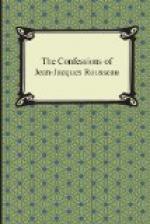I expected to find Venture still at Annecy, and promised myself to obtain a recommendatory letter from him to the Abbe Blanchard; but he had left that place, and I was obliged to content myself in the room of it, with a mass in four parts of his composition, which he had left with me. With this slender recommendation I set out for Besancon by the way of Geneva, where I saw my relations; and through Nion, where I saw my father, who received me in his usual manner, and promised to forward my portmanteau, which, as I travelled on horseback, came after me. I arrived at Besancon, and was kindly received by the Abbe Blanchard, who promised me his instruction, and offered his services in any other particular. We had just set about our music, when I received a letter from my father, informing me that my portmanteau had been seized and confiscated at Rousses, a French barrier on the side of Switzerland. Alarmed at the news, I employed the acquaintance I had formed at Besancon, to learn the motive of this confiscation. Being certain there was nothing contraband among my baggage, I could not conceive on what pretext it could have been seized on; at length, however, I learned the rights of the story, which (as it is a very curious one) must not be omitted.
I became acquainted at Chambery with a very worthy old man, from Lyons, named Monsieur Duvivier, who had been employed at the Visa, under the regency, and for want of other business, now assisted at the Survey. He had lived in the polite world, possessed talents, was good-humored, and understood music. As we both wrote in the same chamber, we preferred each other’s acquaintance to that of the unlicked cubs that surrounded us. He had some correspondents at Paris, who furnished him with those little nothings, those daily novelties, which circulate one knows not why, and die one cares not when, without any one thinking of them longer than they are heard. As I sometimes took him to dine with Madam de Warrens, he in some measure treated me with respect, and (wishing to render himself agreeable) endeavored to make me fond of these trifles, for which I naturally had such a distaste, that I never in my life read any of them. Unhappily one of these cursed papers happened to be in the waistcoat pocket of a new suit, which I had only worn two or three times to prevent its being seized by the commissioners of the customs. This paper contained an insipid Jansenist parody on that beautiful scene in Racine’s




